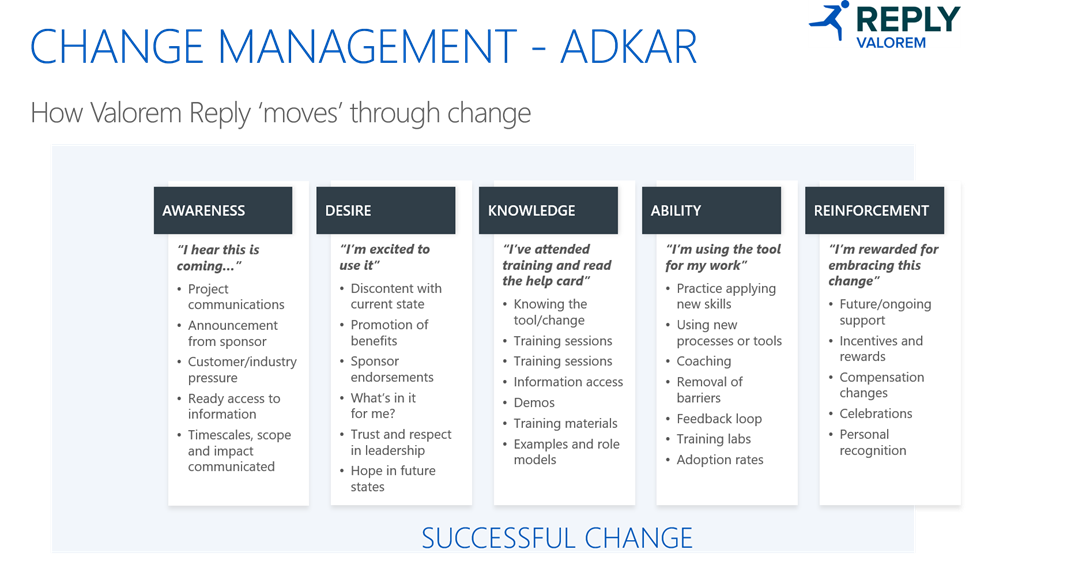The age of digital transformation is upon us. As businesses continue to adopt leading-edge technology that promises competitive gains, so must the operational groups that support them. For many organizations, IT operations are an afterthought, and innovation in this space has lagged. Traditional IT operations processes and practices can no longer keep up with the blistering pace of change today’s business landscape demands. To combat this, industry leaders have turned to DevOps.
 |
"DevOps is the union of people, process, and products to enable continuous delivery of value to our end users." - Donavan Brown, Microsoft |
DevOps is more than technology and tools. Successful adoption of DevOps by an organization requires a disruptive shift in the culture of technology delivery. When Valorem Reply started down its own transformation path, we learned this first-hand. We started with the basics. Broad implementation of Continuous Integration and Continuous Delivery (CI/CD) pipelines was the foundation. Manual configuration and update process were replaced with automated build agents and configuration scripts, turning code deployments into routine, low-risk events. A Continuous Testing strategy was adopted, leveraging Testing Automation and a left-shift strategy that values “Test Early, Test Often” over more traditional human controls and decision points. Product teams were restructured around multi-disciplinary development units versus more traditional functional team alignments. And that was just the beginning.
DevOps transformation is a continuous journey. One of the most common questions we hear from clients considering a change is “How do I know if this will work for me?” Often the most difficult decision is simply the decision to start. The DevOps community is strong and there’s a wealth of publicly available resources available to help business leaders better understand how modern IT operations can benefit their organization. However, there is no one size fits all strategy. Every successful transformation is different. Ultimately the answers will be discovered along the way. Here are a few tips to get you going.
The first step is simply making the commitment. If key leadership is not on board or not convinced that your team/organization can benefit from this approach, then it will likely fail. As is the case for most successful change management initiatives, leadership needs to be at the helm and fully supportive.
Start by asking yourself these simple questions:
- Is deploying updates to your products a high-risk, disruptive event?
- Are you frequently releasing product updates?
- Do operational issues in production systems demand last minute heroics and unplanned effort?
- Are testing and quality control efforts on-going, or do they occur near the end of a development cycle?
- When the operations teams perform server maintenance, does it typically take place in the night?
- Do activities such as standing up new servers, updating firewalls, etc. routinely require extended processing delays and service downtime?
If the answer to any of these are yes, you’re not alone. Traditional IT operations bottlenecks are at the heart of the problem. A successful DevOps transformation can help. Not only will it improve delivery of the value stream for your customers, it can have significant positive impact on the work-life of your employees. By removing some of the most frustrating aspects of their day-to-day responsibilities, you empower them to be more productive. This can have a ripple effect across your entire organization.
This process will not be simple or fast. Like any organizational initiative you can expect resistance. You’ll have setbacks. Progress will be incremental. Remember, truly embracing the principles DevOps espouses requires cultural transformation as much as it does process and technology changes. Just remember why you’re embarking on this journey and don’t look back - look forward.
Consider starting with the daily activities of both the Development team(s) and Operations team(s). Bring them together and discuss pain points to a deployment, system patching, hardware changes, etc. Face-to-face meetings are preferred whenever possible. Devise a plan of attack that focuses on collaboration over functional silos. Kanban is a great model for visibility. Have your teams meet daily – normally at the start of the day. Keep these meetings short and to the point (15 minutes is the goal!):
- What did you complete yesterday?
- What are you working on today?
- What is blocking progress?
Nurture a blameless culture in these conversations – encourage the team to collaborate to solve. As team members begin to understand failure is acceptable, they will become more engaged in solving the challenges and less concerned about avoiding them. This encourages innovation and acceptable risk-taking, both of which are necessary to realize tangible change.
| |
|
Kanban is a lean method to manage and improve work across human systems. This approach aims to manage work by balancing demands with available capacity, and by improving the handling of system-level bottlenecks.
|
There are many, many steps beyond this. Success will be realized one day at a time. A DevOps transformation starts from the ground-up. Each step builds on the previous. Ensure you are monitoring adoption and impact along the way. If something isn’t working as expected, try something else. You’re starting down a path that can pay great dividends, but it does require patience and persistence. Don’t get frustrated if things don’t initially go as planned.
The long-term impact of adopting DevOps for your company can be profound. Moving IT operations from a reactionary, highly manual process to an agile, proactive, collaborative effort is truly transformation. Valorem Reply can help. We have the expertise and experience to take you as far along this path as you’d like to go.
Our approach is heavily focused on practical implementations of DevOps principles that speak to your specific needs. Additionally, we spend significant time up-front focused on change management to help you overcome internal resistance and realize broad company-wide adoption. Valorem Reply advocates for the ADKAR approach to adoption of disruptive change. ADKAR is a proven change management process that we apply across our entire Digital Transformation strategy portfolio.

Ready to get started? The first step would be a
Digital Maturity Engagement. Our Digital Strategy experts will walk you through the process of understanding where you are today and help reconcile that with where you want to go. Reach out to us as
marketing@valorem.com to learn more!


